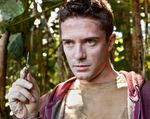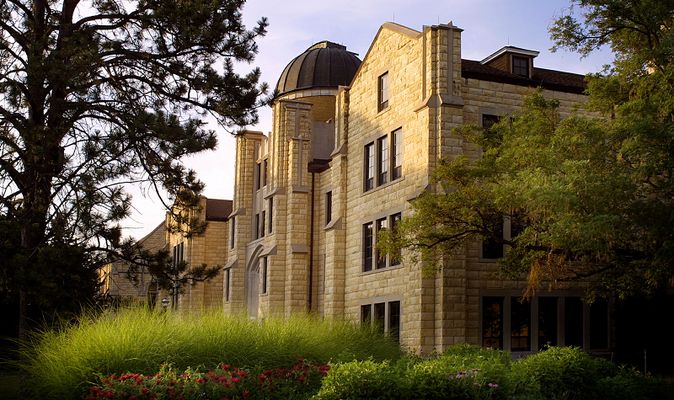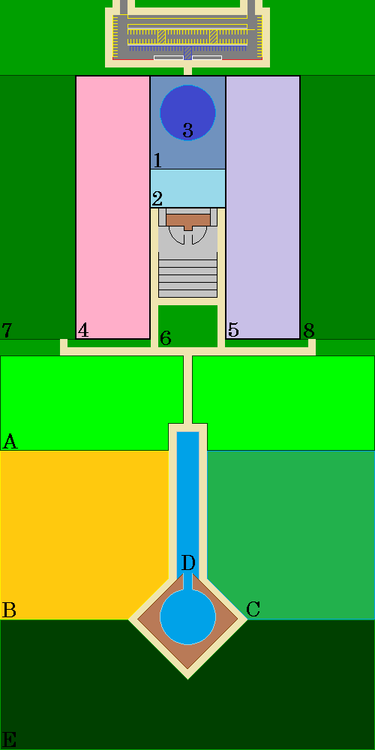Difference between revisions of "PRP museum"
imported>RedPresident |
imported>WhoopingCrane |
||
| (26 intermediate revisions by 3 users not shown) | |||
| Line 39: | Line 39: | ||
{| width="100%"| colspan="2" | {| width="100%"| colspan="2" | ||
|- | |- | ||
| − | ! | + | ! 1 |
| − | | | + | | The grand hall is big. There's a gift shop, information desk, and even a food court. While there's room for expansion, El China Burger, Stromboli's Village Haus, and The Muse Cafe are currently the only options. |
| − | |||
| − | |||
|- | |- | ||
| − | ! | + | ! 2 |
| − | + | | In an area south of the Grand Hall, the Discovery Zone is set aside to make science seem fun and engaging to children of all ages. | |
|- | |- | ||
| − | ! | + | ! 3 |
| − | | | + | | The observatory normally opens at sunset and closes an hour before dawn. Food is available on the landing, provided by The Muse Cafe. Sadly, what was cutting edge technology in the 50's is now outdated. |
|- | |- | ||
| − | ! | + | ! 4 |
| − | | | + | | The West wing of the museum is dedicated to Art. Much of it is modern, with a healthy dose of local works. There are some older things in there as well, as well as some artifacts that arguably should be in the history wing, except they are works of art themselves. |
| − | |||
| − | |||
|- | |- | ||
| − | ! | + | ! 5 |
| − | | | + | | The East wing of the museum is devoted to history, including archaeology and a few panoramas of historical scenes. There's fossils as well, including a complete Diplodocus carnegiei, among pieces of larger dinosaurs and some smaller complete reproductions. |
| − | |||
| − | |||
|} | |} | ||
| Line 69: | Line 63: | ||
|- | |- | ||
|- | |- | ||
| − | ! | + | ! 6 |
| − | | | + | | Directly south of the main building, a large outdoor theater is permanently installed. |
| − | |||
|- | |- | ||
| − | ! | + | ! 7 |
| − | | | + | | To the west of the main building, in a secluded side yard, a sculpture garden with newer modern designs. |
| − | | | + | |- |
| + | ! 8 | ||
| + | | To the east of the main building, in a secluded side yard, a sculpture garden with reproductions of classic works. | ||
| + | |- | ||
| + | ! A | ||
| + | | The northern portion, representing California's grasslands. | ||
| + | |- | ||
| + | ! B | ||
| + | | The eastern portion, representing California's deserts. | ||
| + | |- | ||
| + | ! C | ||
| + | | The western portion, representing California's wetlands. | ||
| + | |- | ||
| + | ! D | ||
| + | | The central portion, representing California's rivers. | ||
| + | |- | ||
| + | ! E | ||
| + | | The southern portion, representing California's forests. | ||
|} | |} | ||
| Line 81: | Line 91: | ||
| − | |||
| − | |||
| − | |||
| − | |||
| − | |||
| − | |||
| − | |||
| − | |||
</div><div style="float: left; width: 30%"> | </div><div style="float: left; width: 30%"> | ||
{| width="100%" | colspan="2"| | {| width="100%" | colspan="2"| | ||
|- | |- | ||
| − | ! <font color=black style="font-size: 16pt; text-shadow: 5px 5px 8px gray;">Nicolette Carnegie Group</font> | + | ! colspan="2" | <font color=black style="font-size: 16pt; text-shadow: 5px 5px 8px gray;">Nicolette Carnegie Group</font> |
| + | | | ||
|- | |- | ||
| width=100 | <center>[[File:Druitt Profile.jpg|150px|link=Druitt]]<br>[[Druitt|Dr. John M. Druitt]]<br>Chairmain</center> | | width=100 | <center>[[File:Druitt Profile.jpg|150px|link=Druitt]]<br>[[Druitt|Dr. John M. Druitt]]<br>Chairmain</center> | ||
| width=200 | <center> Practicing Doctor of Veterinary Medicine, Art Lover, and Philanthropist. </center> | | width=200 | <center> Practicing Doctor of Veterinary Medicine, Art Lover, and Philanthropist. </center> | ||
|- | |- | ||
| − | | width=100 | <center>[[File: | + | | width=100 | <center>[[File:Steve Foreman.jpg|150px|]]<br>Dr. Steve Foreman (NPC)<br>Board Member</center> |
| − | | width=200 | <center> | + | | width=200 | <center> Doctor of Veterinary Medicine, Former Marine, Motorcycle Enthusiast and Outdoorsman </center> |
| + | |- | ||
| + | |} | ||
| + | <br> | ||
| + | {| | ||
| + | ! colspan="2" | <font color=black style="font-size: 12pt; text-shadow: 5px 5px 8px gray;">Employees</font> | ||
| + | | | ||
| + | |- | ||
| + | | width=100 | <center>[[File:chaspic.jpg|150px|link=Chastity]]<br>[[Chastity|Chastity Chapman]]<br>Research Associate</center> | ||
| + | | width=200 | <center> Historian and researcher, tasked with sorting out the vast and often unlabeled Primrose Collection. </center> | ||
|- | |- | ||
|} | |} | ||
<br> | <br> | ||
{| | {| | ||
| − | ! <font color=black style="font-size: 12pt; text-shadow: 5px 5px 8px gray;"> | + | ! <font color=black style="font-size: 12pt; text-shadow: 5px 5px 8px gray;">Directions</font> |
|- | |- | ||
| − | | | + | | The Primrose is located at 5 Museum Drive, Prospect California. Museum drive is located west of Olive Street and intersects with Lincoln Boulevard. The Primrose has ample parking and offers valet services. For your added convenience, there is a public transit bus stop at the Museum, and a subway station at Olive and Lincoln. Bicycles are welcome as well, but please, no mopeds. |
| − | |||
|- | |- | ||
| − | | | + | | height=25 | |
| − | |||
|- | |- | ||
| + | | The PRP Museum is located at grid #1515, the location of Lincoln Blvd. and Olive St. One may use '''+hangout/jump prp''' to travel there. | ||
| + | | | ||
|} | |} | ||
| + | <br> | ||
{| | {| | ||
| − | ! <font color=black style="font-size: 12pt; text-shadow: 5px 5px 8px gray;"> | + | ! <font color=black style="font-size: 12pt; text-shadow: 5px 5px 8px gray;">Map</font> |
|- | |- | ||
| − | | | + | | To scale map of the expansive P.R. Primrose Museum property. The exterior walls run 500 yards East-West and 1000 yards North-South, enclosing over 100 acres of grounds. Labels correspond with Exhibits, Attractions, and Grounds. |
|- | |- | ||
| height=25 | | | height=25 | | ||
|- | |- | ||
| − | | | + | | [[File:PRP_Map.png|375px]] |
| | | | ||
|} | |} | ||
| + | <br> | ||
| + | {| | ||
| + | ! <font color=black style="font-size: 12pt; text-shadow: 5px 5px 8px gray;">Notes</font> | ||
| + | |- | ||
| + | | While the information concerning the history of the museum and it's exhibits is easily acquired in character, often with a hand wave, the information concerning the patron group is not as easy to come by. The members of the group ask that you speak to them personally before assuming that your character has any in character knowledge of their involvement in this project. | ||
| + | |- | ||
| + | |} | ||
| + | |||
| + | [[Category:Business]] | ||
Latest revision as of 10:05, 20 August 2017
| The Museum |
|---|
History
| The infamous P.R.P Museum, named for its creator Mr. Pandareos Ramses Primrose, though often called simply “The Primrose” is something of a local legend. P. R. Primrose made his fortune early, lucky enough to be involved in America’s efforts in World War Two as a contractor whose family was already heavily invested in commodities like steel and oil. When the war ended, Pandareos took to Philanthropy, including several tours of Africa, Europe, and Asia for humanitarian missions that also allowed him to gather quite the personal collection of art and artifacts. Of course not everybody is so fond of the Primrose collection, as some view him as a grave-robber and thief. In the early Fifties, Mr. Primrose was convinced by his wife to build a Museum to showcase the collection. A site was selected near Prospect, California, where the couple had a summer home, on which to build their legacy. The location, originally comfortably south of town, was on land with some history of its own. Natives had resided there before the Spanish arrived and established a small mission and settlement. After a season of great illness and many deaths, a more permanent Mission was established farther north. Rumors persist to this day that there are burial grounds and catacombs under the hillside property. In modern times the city has expanded, encroaching to the edge of the property and private road that leads to the facility. Thankfully for some though, this brings the benefit of public transportation to the Museum’s doorstep. The Primroses, being rich eccentrics to begin with, became convinced after a construction accident that the original plans should be changed. This lead to the majority of the third, fourth, and basement levels to be constructed in a sturdy, but haphazard fashion, with some areas still left in an unfinished state. Backing up their superstitions was the Communist Sympathizer trial that, while eventually clearing the pair, did delay construction even further. The threat of nuclear war also lead the pair to place a sizable bomb fallout shelter under the building, though they used their influence to keep it off the public plans. In late Sixties the more traditional first and second floors were completed, with much of the Primrose collection moved inside for storage and eventual exhibit. Despite ongoing construction, markedly the addition of a space-race era roof-top observatory [Night Zone] over the grand entryway, the Museum was scheduled to open in the early Seventies after over fifteen years of construction. Of course, the then whispered Primrose curse struck again, and from 1970 to 1972 the Primroses lost a young child in a yachting accident, and Mrs. Primrose miscarried a second when she took ill. If that was not bad enough, Pandareos’s behavior became erratic as the museum neared completion and it’s scheduled grand opening. In the months prior to the event, he was committed to psychiatric hospital after being certified insane. There were rumors that Mrs. Primrose was just as batty, but she was able to pass (barely) the testing that would have had her locked up with her husband. Distraught, but in legal control of the couples combined wealth and property, Mrs. Primrose ordered the museum shuttered. She refused to open the building as long as her husband was held a “political prisoner of a corrupt federalist-progressive system.” The property was maintained, but mothballed, and sat empty as the dust gathered and the city expanded. In the Spring of 2013 Mr. Primrose finally died at the hospital and Mrs. Primrose, quite elderly herself, decided with her husband dead there was no further need to protect his property. The Nicolette Carnegie Memorial Group placed a rather ridiculous bid for the location. They beat out a few interested parties, the most noteworthy being the Marsh Institute who's bid was generous, but more reasonable. Efforts were made to modernize the facility, acquire additional exhibits, and prepare the facility for its Grand Opening, nearly sixty years after construction began. The largest of these efforts being a remodel of the original grand entry way to include a food court reflecting cuisine from around the world, and re-development of the museum grounds. The walls and gates have been refurbished, and the outdoor theater at the rear of the building updated for modern technology. The side gardens will retain some sculptures while new ones will be added. Of note, is the complete re-landscaping of the rear grounds using plants local to California and arranged into different habitat zones. In addition, Dr. Steve Foreman, local Veterinarian plans to house injured and recovering wildlife in special habitats at the facility prior to reintegration for community education purposes. |
Exhibits and Attractions
| 1 | The grand hall is big. There's a gift shop, information desk, and even a food court. While there's room for expansion, El China Burger, Stromboli's Village Haus, and The Muse Cafe are currently the only options. |
|---|---|
| 2 | In an area south of the Grand Hall, the Discovery Zone is set aside to make science seem fun and engaging to children of all ages. |
| 3 | The observatory normally opens at sunset and closes an hour before dawn. Food is available on the landing, provided by The Muse Cafe. Sadly, what was cutting edge technology in the 50's is now outdated. |
| 4 | The West wing of the museum is dedicated to Art. Much of it is modern, with a healthy dose of local works. There are some older things in there as well, as well as some artifacts that arguably should be in the history wing, except they are works of art themselves. |
| 5 | The East wing of the museum is devoted to history, including archaeology and a few panoramas of historical scenes. There's fossils as well, including a complete Diplodocus carnegiei, among pieces of larger dinosaurs and some smaller complete reproductions. |
The Grounds
| 6 | Directly south of the main building, a large outdoor theater is permanently installed. |
|---|---|
| 7 | To the west of the main building, in a secluded side yard, a sculpture garden with newer modern designs. |
| 8 | To the east of the main building, in a secluded side yard, a sculpture garden with reproductions of classic works. |
| A | The northern portion, representing California's grasslands. |
| B | The eastern portion, representing California's deserts. |
| C | The western portion, representing California's wetlands. |
| D | The central portion, representing California's rivers. |
| E | The southern portion, representing California's forests. |
| Nicolette Carnegie Group | ||
|---|---|---|
 Dr. John M. Druitt Chairmain |
||
 Dr. Steve Foreman (NPC) Board Member |
||
| Employees | ||
|---|---|---|
 Chastity Chapman Research Associate |
||
| Directions | |
|---|---|
| The Primrose is located at 5 Museum Drive, Prospect California. Museum drive is located west of Olive Street and intersects with Lincoln Boulevard. The Primrose has ample parking and offers valet services. For your added convenience, there is a public transit bus stop at the Museum, and a subway station at Olive and Lincoln. Bicycles are welcome as well, but please, no mopeds. | |
| The PRP Museum is located at grid #1515, the location of Lincoln Blvd. and Olive St. One may use +hangout/jump prp to travel there. |
| Notes |
|---|
| While the information concerning the history of the museum and it's exhibits is easily acquired in character, often with a hand wave, the information concerning the patron group is not as easy to come by. The members of the group ask that you speak to them personally before assuming that your character has any in character knowledge of their involvement in this project. |

